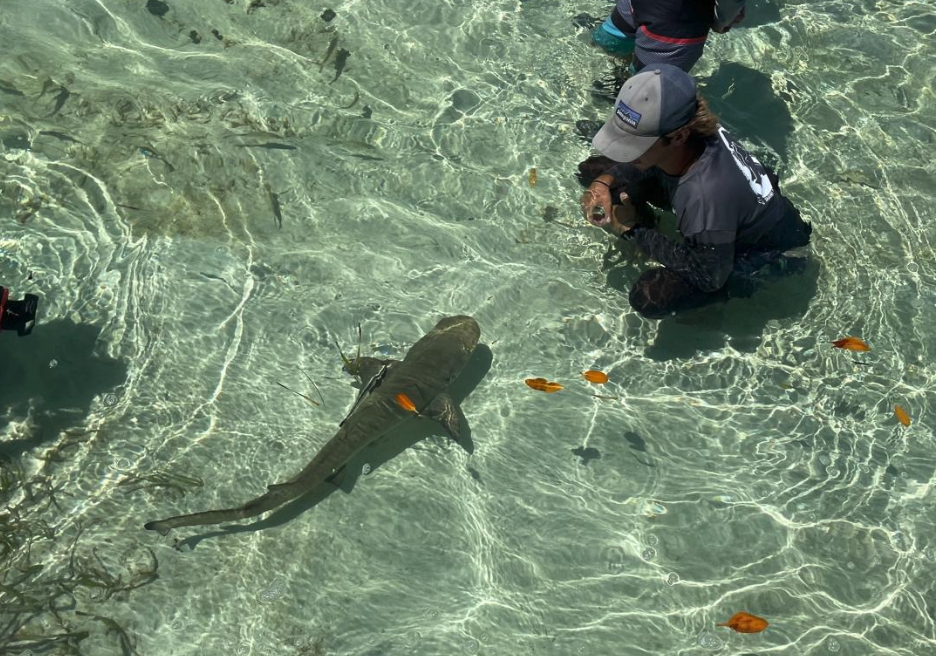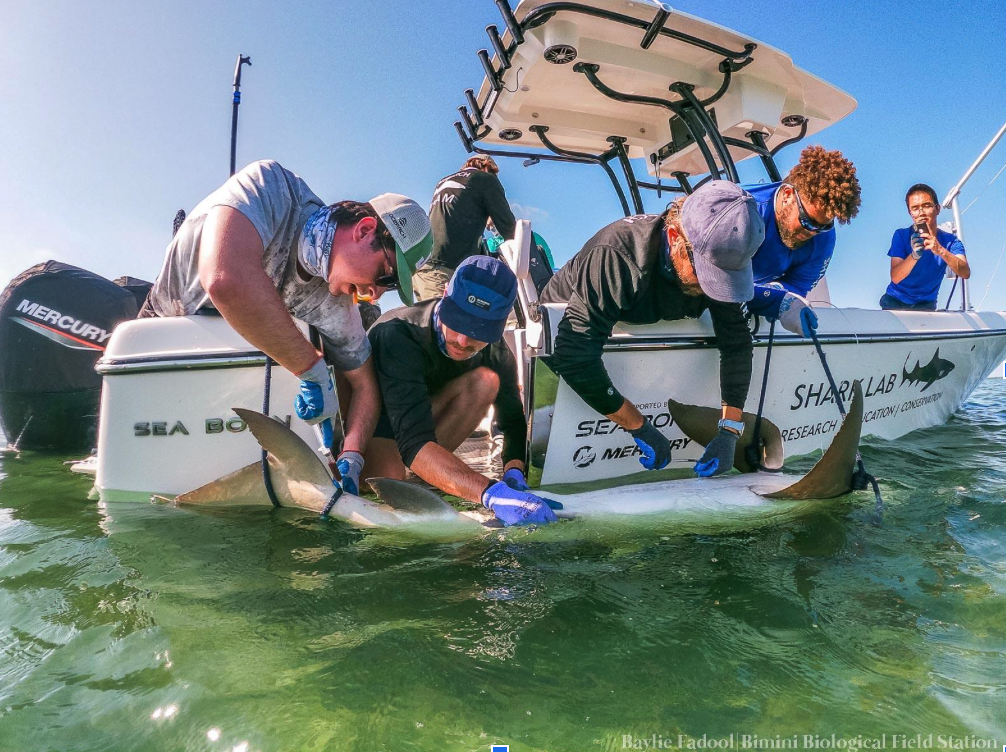Jack Dales is a Master’s student in the Biology and Marine Science Department at Jacksonville University. Dales was awarded a Guy Harvey Scholarship in 2022.
Lemon sharks have taken me to the Bahamas, the Florida Keys and along the eastern coast of Florida and Georgia. My research focuses on habitat utilization and the diet of juvenile lemon sharks from various nursery areas across the Western North Atlantic. Nurseries are areas where young sharks are protected from larger predators, allowing juveniles to grow to large enough sizes. While the fieldwork has proven challenging, it’s also extremely rewarding. I’ve been able to travel and conduct fieldwork in remarkable places thanks to Jacksonville University’s Marine Science Research Institute, the Bimini Shark Lab and the Guy Harvey Ocean Foundation.

Jack Dales with a juvenile lemon shark in Bimini, Bahamas.
Oddly enough, I got my feet wet in the world of marine science during my undergraduate degree at Michigan State University. Although surrounded by the freshwater of the Great Lakes, I was able to intern at the Cape Eleuthera Institute (CEI) in the Bahamas and later return as a research technician. While at CEI, I was first introduced to lemon sharks during a sampling trip in the mangrove tidal creeks in South Eleuthera. We managed to capture a few juveniles to be used for a diet reconstruction laboratory experiment analyzing fecal samples. The samples I helped collect, successfully determined that digested prey items from the controlled feeding experiment could be detected without environmental DNA contamination. Although the project was only for a few short weeks, being able to work with juvenile lemon sharks daily changed the trajectory of my career. I took what I learned at CEI and later accepted an internship at the Bimini Shark Lab following my graduation from Michigan State. The Shark Lab has been conducting work on lemon sharks since its establishment in 1990 and was the perfect next step for my career and to continue to work with a species that fascinates me. I was able to build off my previous experiences, learn new skills and make new connections that have ended up shaping my early career and forming my master’s thesis project at Jacksonville University.
My first research trip in graduate school took place in the Marquesas Keys, Florida in conjunction with the Bimini Sharklab, Shedd Aquarium and Florida State University’s Coastal and Marine Lab. I made the 5-hour drive from Jacksonville to Miami and proceeded to hop on Shedd Aquarium’s 80-foot research vessel, The R/V Coral Reef II, and make the 15-hour boat drive to the Marquesas Keys. Our team set out to capture juvenile lemon sharks for genetics and stable isotope analysis. We collected genetic samples for analysis to determine if lemon sharks in the Marquesas Keys return to the same nurseries they were born in, a term called natal philopatry. Stable isotope samples consist of small tissue samples that are analyzed to determine diet and habitat use. In addition to the lemon shark work, I was able to assist with other projects that focused on smalltooth sawfish, tiger sharks, and scalloped and great hammerheads.
While the work is often challenging, when life gives you lemons, lemons may change your life.
Jack Dales

An adult lemon shark is tagged with an internal acoustic transmitter and has a small blood sample taken. Photo by Baylie Fadool.
In addition to the lemon shark work in the Marquesas Keys, I’ve also joined the Bimini Shark Lab on a couple of their monthly research trips to the lower Florida Keys. The Sharklab has many ongoing projects focusing on the movements of bull sharks, hammerheads, and tiger sharks. You can read more on the Shark Lab’s research and news. On my last trip in February, I was able to collect samples from 16 juvenile lemon sharks for my thesis project. Additionally, I assisted in outfitting a great hammerhead with a satellite tag, allowing the shark lab to track its movements.
Currently, I’m focusing my work on juvenile lemon sharks in Cape Canaveral, Florida and coastal Georgia. Juveniles that are born in the coastal areas of the Carolinas and Georgia during the summer months will undergo extensive migrations south to Cape Canaveral. This is unusual compared to other juvenile lemon sharks in the Bahamas and the Florida Keys, who remain within their nurseries until they reach large enough sizes to venture to other areas. My thesis project hopes to provide insight into the varying ecological differences of juvenile lemon sharks between the four nursery sites.
When I first arrived at CEI, I had no clue that I would be doing what I am today. Although very early in my career, I’ve been very fortunate to work on some fascinating projects, meet inspiring people, and travel to incredible places. While the work is often challenging, when life gives you lemons, lemons may change your life.